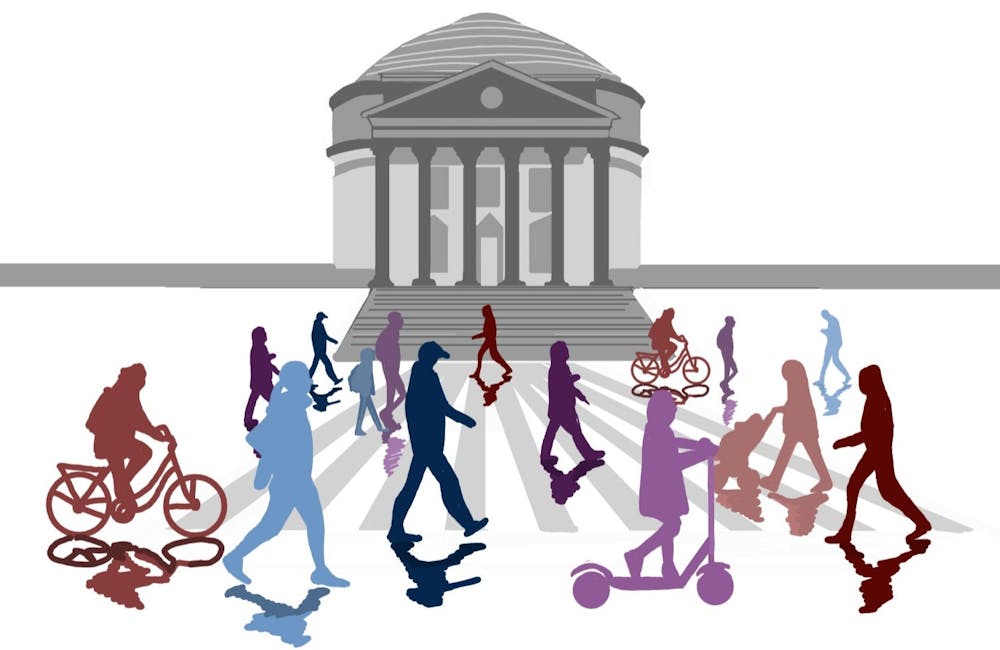In the past few weeks, first-year students may have noticed a unique table set up by Observatory Hill Dining Hall. It wasn’t Chi Alpha or the Hullabahoos but the University Police Department. At this table, UPD was giving a simple notice to students — we are going to start pulling over your electric scooters. These notices are not the first action taken against electric scooters, and they may not be the last. Rather, these notices represent one among many actions taken by Charlottesville and the University to recenter pedestrian safety in their urban planning. Although it is perhaps the bare minimum, it is nonetheless laudable that the University and Charlottesville are beginning to prioritize the safety of pedestrians, especially in an impressively multi-pronged approach.
Amid a national crisis of pedestrian safety, Charlottesville and the University are also struggling to properly maintain pedestrian safety. In the past year, there have been instances of extreme collisions between pedestrians, scooter riders and cars in addition to smaller, anecdotal experiences of imperfect pedestrian safety standards. The notices provided by UPD stand as but one example of increasing efforts to respond to this reality. To combat the danger of unsafe crosswalks, the Charlottesville City Council released final designs last month for renovating the Barracks Road and Emmet Street intersection and approved the appropriation of funding towards a pedestrian-bike lane on Rugby Avenue. In its own policies, the University has taken a slightly different path towards protecting pedestrians — they are working to ensure safe and responsible usage of electric scooters by emphasizing that riders must obey traffic laws. In working to improve pathway options, secure sidewalks and enforce scooter regulations, the Council and the University are actively working to protect pedestrians from collisions and injuries.
The measures taken by the Council and University to fortify pedestrian safety are doubly necessary given the lethargy displayed at the state level. A bipartisan bill focused on strengthening safety measures at Virginia universities died in the Virginia House of Delegates. This bill would have improved university crossing zones by designating them as school zones and thus decreasing the speed limit permitted in that area. The state-level neglect of this national issue has ensured the need for local authorities and institutions like the Council and University to take action — which they have commendably done.
Notably, this is not the first time that action has been taken on the local level to address ongoing pedestrian safety concerns. In 2019, electric scooters were a topic of such concern across the City of Charlottesville and Grounds that the Council ultimately voted to tighten restrictions so much that the scooter company Lime was forced to leave. This freed up the market and allowed Veo to gain massive popularity. Since then, Veos have proven useful to University students — 65 percent of users in Charlottesville are students. In this way, it is clear that Veos play an important role in student transportation networks. At the same time, however, they have been shown to be exceptionally dangerous both to their “drivers” and passersby, especially if riders do not follow established regulations. Ultimately, appreciating the important role Veos play in this community should not stop us from achieving a safe medium — maintaining travel options for students and safety for pedestrians. The University policies endeavor to achieve this balance.
In prioritizing pedestrian safety, UPD has endeavored to raise awareness for previously under-advertised policies and mechanisms for scooter safety. We applaud UPD for not immediately adopting reactive measures which promote retributive punishment. UPD could have immediately begun issuing traffic citations of up to $2,500 to scooter riders who violate traffic laws. While fines may seem like a relatively tame option, they end up punishing each person to a different degree in a way that reinforces hierarchies of privilege. Instead of relying exclusively on fines, the University has worked to prioritize educational initiatives in a way that recognizes the importance of placing preventative policies over punitive practices.
The actions taken by the Council and by the University represent a laudable focus on their residents and students and an insistence on proactive, educational measures. Moreover, considered in their totality, these actions address the issue of pedestrian safety on many levels — intersections, sidewalks and non-vehicular forms of transportation — instead of adopting a monochromatic approach. Pedestrian safety is not something which Charlottesville residents or University students should compromise on. As University students, pedestrian safety is at the heart of every part of our lives, and we — as a community — must continue to advance innovative and proactive solutions to ensure student safety.
The Cavalier Daily Editorial Board is composed of the Executive Editor, the Editor-in-Chief, the two Opinion Editors, the two Senior Associates and an Opinion Columnist. The board can be reached at eb@cavalierdaily.com.







